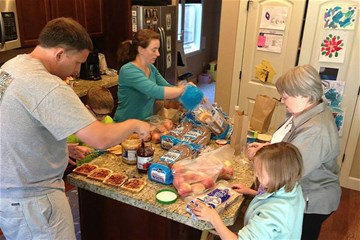Portland, the host of the denomination's 2016 General Conference, led the trend of decreasing worship attendance affecting U.S. churches regardless of their theology. A 2015 survey by the Public Religion Research Institute found that Portland is the U.S. metro area with the highest percentage of residents with no religious affiliation — some 42 percent of the population.
In much of the Pacific Northwest, people would rather get their teeth cleaned than go to church, the Rev. Beth Ann Estock said.
Estock is a church coach and planter in Portland, Oregon. She is also among the United Methodists reviving Christian community in what many demographers call the "None Zone" — where more people answer "none" when asked their religion than identify with any single faith group.
United Methodists in Portland and other parts of the "None Zone" are taking the lead in another way. They are coming up with new ways to do church that reach people who don't like church.
So how do you make disciples where people are more likely to spend their Sunday mornings beneath tall trees than a tall steeple? Estock and others suggest ditching the steeple and possibly ditching the Sunday morning schedule too.
Here are two examples of experimental churches in Oregon.
About four years ago, Estock began working on house churches. So far, she has two, and one of the participants has plans to start more.
 |
| The Revs. Eilidh (left) and Jeff Lowery pause during Sellwood Faith Community's volunteer activities at the Oregon Food Bank in Portland. Photo courtesy of the Rev. Eilidh Lowery |
She initially named the church community Zacc's House after the "wee little" tax collector Zaccheus who ended up playing host to Jesus. But she listened to participants and they came up with the name SpiritSpace to emphasize the group's work on developing spiritual practices and living into God's call.
SpiritSpace is just one example of a homey, experimental church. Sellwood Faith Community, a United Methodist church plant started less than three years ago, is another.
Sellwood meets for "dinner church" on Sunday nights in the home of founders the Revs. Eilidh and Jeff Lowery as well as on Wednesday nights at a local restaurant. The Lowerys' home once served as a parsonage for the now-closed Sellwood United Methodist Church, and it offers ideal worship space for small groups, Eilidh Lowery said.
Unlike Estock's focus on individual homes, the Lowerys' mission field is mainly focused on a neighborhood of young families that once was its own town before being absorbed into the bigger city of Portland.
The Lowerys are deeply engaged volunteers in the neighborhood, and they invite people to "gateway events" to introduce the unchurched to Christian community.
Neither Estock nor the Lowerys envision these new congregations ever moving into their own buildings and offering conventional Sunday services.
Both church starts want to remain true to their funky Portland context while also taking a page from Methodism's founder John Wesley, whose class meetings they each emulate to some degree.
Neither Estock nor the Lowerys know yet whether these kind of ministries ultimately will be financially sustainable or achieve numbers that look good on church forms.
Heather Hahn, multimedia news reporter, UMNS.
One of seven apportioned giving opportunities of The United Methodist Church, the World Service Fund is the financial lifeline to a long list of Christian mission and ministry throughout the denomination. Please encourage your leaders and congregations to support the World Service Fund apportionment at 100 percent.





